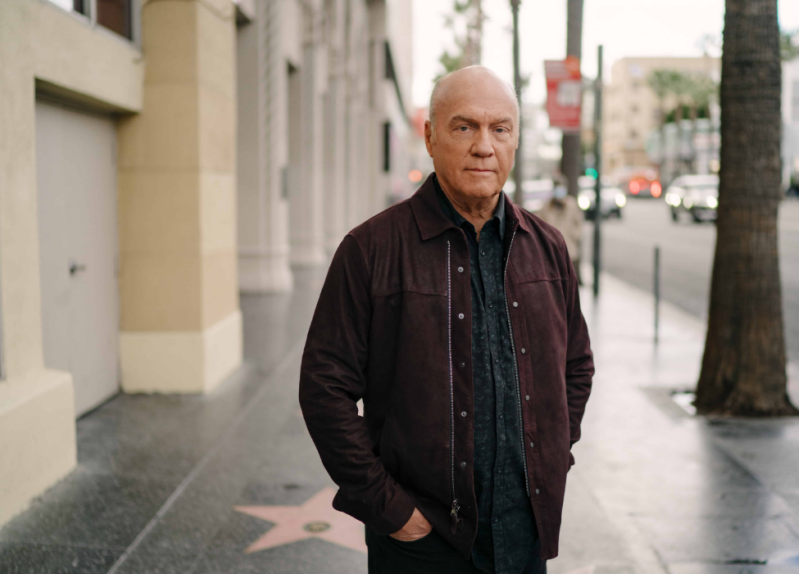
Evangelist Greg Laurie with a global ministry has led one million people in commitments to the Lord in the past five decades and he is the senior pastor of Harvest Christian Fellowship based in California and Hawaii. His personal story of salvation has also been the main focus of the widely acclaimed Lionsgate movie, Jesus Revolution, set in the 1960s and 1970s and starring Joel Courtney as a teenage Laurie with Jonathan Roumie (Jesus in The Chosen TV series) as Christian hippie Lonnie Frisbee.
Laurie gave an exclusive interview to Christian Daily International/Christian Post before publicly speaking about "The gift and calling of an evangelist" at the European Congress on Evangelism organized by the Billy Graham Evangelistic Association held May 27-30 at the JW Marriott hotel in Berlin, Germany.
Laurie recalls a private moment with the late Billy Graham—whom Laurie calls “one of the greatest, if not the greatest evangelist in human history, apart from the Apostles”—when the two had lunch together, some time before Graham passed away. Laurie asked the older evangelist for his wisdom: “If an older Billy could speak to a younger Billy, what would you say to yourself?”
“I would remind myself to preach more on the cross of Christ and the blood of Christ because that is where the power is,” replied Graham.
“I have never forgotten that,” Laurie reflects, “and I’m going to mention that to the evangelists here [in Berlin] because the message of the evangelist is very simple and we have to avoid complicating it.”
Laurie spent a lot of time with Graham towards the end of his ministry and he has been on the BGEA board of directors for 25 years. He accompanied him at crusades, supported behind the scenes and helped the older evangelist with preparing messages—at Graham’s personal request.
This privilege of spending time with Billy Graham became “a time of great training” for Laurie. It helped him to see that “some things you can have taught to you by a person but other things you observe by being with them. You look at their lifestyle and how they carry themselves and how approachable they are to people and that sort of thing.”
“I felt like I was enrolled in the finest evangelist university on Earth because there's no greater evangelist of the twentieth century than Billy Graham,” he adds. “And he brought the gospel to more people than any other person ever.”
Laurie misses Graham, an “extraordinarily gifted evangelist who was also a pastoral figure to every American president going back to Harry Truman to Obama. We don't have anyone quite like him on the scene today, and I wish we did. But, you know, sometimes people claim they're carrying on the ministry of Billy Graham or they've taken the mantle of Billy Graham.
“I think Billy Graham was called to be Billy Graham. I think we're all called to bring the gospel to our generation in our way. It was said of David, he served God in his generation. And that's what Billy did. He served God in his generation.”
This understanding of integrity needing to be prevalent within the core of an evangelist’s private life, as it was with Billy Graham, is important for Laurie who brings to the Berlin congress an encouragement for fellow evangelists to be focused without distraction on their task “to preach the gospel, to sow the seed and leave the result ultimately up to God.”
Those who respond to the gospel are not “converted” in a robotic sense but they make “professions of faith and some last and some don’t,” according to Laurie. He emphasises that this doesn’t mean evangelists are excused from follow-up and discipleship but “we try to do everything we can short of being obnoxious to help a person grow in their faith once they've made a profession of faith.”
Laurie adheres to mainstream Protestant church teaching between an evangelical who attends church and shares the love of God differentiated to an evangelist, specially gifted in evangelism: “An evangelical is a term coined not all that long ago to describe Christians who hold to certain views such as we believe in the inspiration of Scripture and you need a relationship with Jesus Christ and so forth. So that would be an evangelical and an evangelist is one called to proclaim the gospel.”
“Now every Christian is called to evangelize because the Great Commission given to us is to go into all the world and preach the gospel and make disciples of all nations, teaching them to observe all things that he has commanded us and and baptizing them in the name of the Father, Son, and Holy Spirit. So every Christian is called to evangelize. But then there are those that are specifically gifted by God as an evangelist.”
That is not to say that an evangelist needs to be someone with “pulpits, and they don’t have large national ministries. They’re just everyday people who are gifted by God to share their faith.”
A sense of understated ordinariness is key for the effectiveness of evangelism, according to Laurie. For the reason that non-Christians often have a stereotypical view of evangelists which can be based upon the familiarity in the cultural trope of the overbearing tele-evangelist: “So they can dismiss us and not listen to what we have to say,” he concedes, adding that is why simple proclamation of the gospel without apologies and in everyday settings is so important.
“I think once someone meets a Christian and begins to build a relationship with them, we can break those stereotypes just by being godly people. By being friendly people and loving people and kind people and people that others would want to be around. One way I phrased it is ‘if you want to win some, be winsome.’”
Laurie cites Phillip as the only specifically identified evangelist in the New Testament but he also sees Peter and Paul as obvious evangelists, as well as apostles. In modern times, Billy Graham had the same calling. Franklin Graham, his son, has the same—and many attendees at the congress [in Berlin] have “it as well.” That is why Laurie wants participants in the congress to be encouraged in the work because he observes not many are known to be called as evangelists in the present day.
“I want to encourage them in the calling God has given them because, frankly, there's not that many people who are called as evangelists today. A lot are called to ministry. Many are called to pastor, but it seems like you don't meet that many who are specifically called to be an evangelist.
“So I have a special heart for them and care for them because I'm one of them.”
Laurie further explains that when he says not many seem to be called as evangelists, this is “probably” a fact in the majority world, and not just the West.
“You just don't see as many people who are called specifically as an evangelist as you might see who are called to be pastors and teachers. But, again, I want to emphasize that every Christian and every spiritual leader is called to evangelize. And so we should all go about the work of bringing the gospel to our culture. So though some are extraordinarily called to this work, every Christian is called to share their faith with others.
“Paul the apostle calls the gospel the ‘power of God unto salvation to everyone who believes.’ And the word he uses for power is the Greek word dunamis [δυναμις]. We get our English word dynamic from it, even dynamite from it. So I believe there's explosive power in the simple yet profound message of the gospel.”
Laurie advises those unsure of their calling as evangelists to be mindful of the advice given in 2 Peter 1:10: Therefore, my brothers and sisters, make every effort to confirm your calling and election. For if you do these things, you will never stumble.
“One of the best ways to find out if you're a leader is to lead and see if anyone follows. And I think that if you are called by God, you will see results and you'll see fruit. But it's not uncommon to see people that were called by God in the Bible struggle with it and even argue with God about it.
“Moses didn't feel qualified to lead the children of Israel. He had some kind of a speech impediment. Gideon said, ‘I'm least in my father's house.’ And others gave what we would call excuses as to why they could not be the one to do what God called them to do.
“But it seems as though the Lord goes out of his way to choose ordinary people to do extraordinary things. And the apostle Paul says, God calls the foolish things of the world to confound the wise. So I think if you believe your call is to be an evangelist, then just go evangelize.”
Laurie adds that obviously practising evangelism helps the evangelist in their calling and they will see fruit, meaning results. He points out that the results of these efforts can vary and highlights how Paul preached to the people of Athens and only a handful were saved and yet on another occasion he preached and many became Christians.
“So it isn't always about how many people respond to your ministry, but there should be some response. And, you know, Jesus said, by their fruit, you will know them. But everybody struggles.
“In fact, I think it's a good thing to struggle with, ‘Am I really qualified to do this?’ Because if you think, ‘I am the most qualified person that ever walked the Earth,’ you probably just disqualified yourself because God wants us to walk humbly before him.”
The ultimate test of success for an evangelist however is not results but faithfulness, according to Laurie. He points out that Jesus on the final day will not say, “Well done good and successful servant” but “Well done good and faithful servant.”
This understanding may conflict with what Laurie calls “the American definition of success” but he points out that God “sees things differently.” This does not mean large events or results are not good. In fact, “they’re a good thing” in accordance with biblical examples such as the day of Pentecost when 3,000 people believed.
“That was big,” Laurie says, “but sometimes success is just based on you obeying God and what he has called you to do. And I think also success is finishing your race well, living a life of integrity, not contradicting what you preach or sabotaging your own ministry by bad choices.
“And so there's a lot of ways to define ultimate success but I think that the simple answer is faithfulness to the calling that God has given you.”






